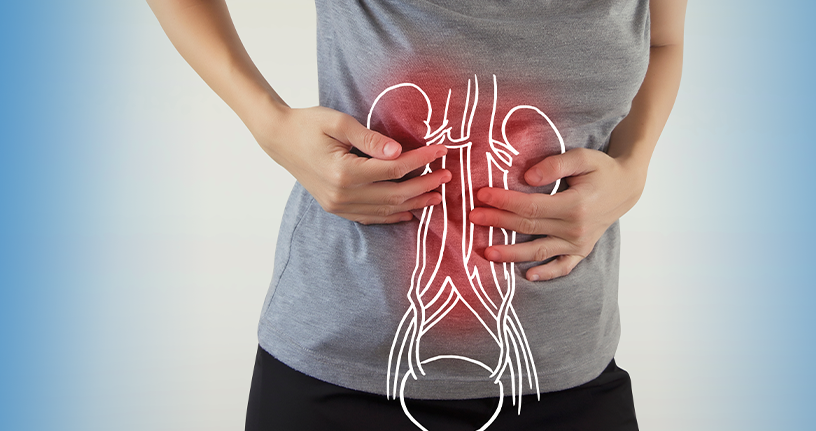Chronic kidney disease includes a variety of conditions that damage your kidneys and decreases their ability to function to keep you healthy by filtering toxins from your bloodstream. If the condition worsens, wastes and toxins can increase your blood levels and make you feel sick. This buildup may lead to complications like anemia (low blood count), high blood pressure, weak bones, nerve damage, and poor nutritional health.
Kidney disease also puts you at high risk for heart and blood vessel disorders. These problems progress slowly over time—early detection and timely treatment help prevent the disease’s worsening. Kidney disorders may eventually lead to kidney damage or failure, which requires dialysis or a kidney transplant to maintain a healthy life.
Kidney disease facts
-
-
- Around 37 million people in the US have Chronic kidney disorders, and millions of others are at increased risk.
- Early detection can keep the chronic disease from getting worse.
- Heart disease is the main cause of death for all people with chronic kidney disease.
-
Common causes of chronic kidney disease?
Hypertension (high blood pressure) and diabetes are responsible for two-thirds of chronic kidney disorder cases.
-
-
- Hypertension – Hypertension (high blood pressure) happens when your blood pressure against the walls of your blood vessels rises. Uncontrolled or poorly controlled blood pressure levels can be a leading cause of heart problems (heart attacks, strokes) and chronic kidney disease. Also, chronic kidney disorders can cause high blood pressure.
-
-
-
- Diabetes – Diabetes occurs when your blood sugar levels remain too high. Over time, extremely high or low blood sugar can cause damage to many vital organs in your body, including the kidneys, eyes, nerves, heart, and blood vessels.
-
What health conditions affect the kidney?
Well, a few other conditions or circumstances can lead to kidney disease.
-
-
- Inherited diseases- Polycystic kidney disease is a common inherited disorder that causes the development of cysts to form in the kidneys and harm the surrounding tissue.
- Glomerulonephritis – It is a group of diseases that give rise to inflammation and affect the kidney’s filtering units. These conditions are known to be the third most common type of kidney disorder.
- Kidney and urinary tract abnormalities before birth include Malformations that occur as a baby develops in the uterus. For example, a passage narrowing prevents normal outflow of urine, ultimately leading to urine flowing back up to the kidney. This causes the development of infections and may damage the kidneys.
- Other causes – Obstructions caused by kidney stones or tumours can damage kidneys. An increased gland or repeated urinary infections in men can also lead to kidney damage.
-
Also Read – The Kidney Stone Issue Is Rising In Teens
What are the risk factors of chronic kidney disease
Anyone can get a chronic kidney disorder at any age. However, some people are more prone to kidney disorders than others. You may have an increased risk for renal insufficiency if any of the following applies to you:
-
-
- You have High blood pressure
- You have diabetes
- You have a history of kidney failure
- Are older
- You belong to a group of populations with a high rate of high blood pressure and diabetes, such as Hispanic Americans, Pacific Islanders, African Americans, and African Americans.
-
How to recognize chronic kidney disease?
Kidney disease slowly progresses, leading to kidney dysfunction. However, one kidney stops functioning properly, and the other can still perform normal functions. A kidney may deteriorate t a certain level of dysfunction and not get any worse. In some cases, however, the condition may lead to kidney failure.
Most people with chronic kidney disorders are unaware they have it because symptoms do not usually occur at early stages. Typically, by the time you recognize the symptoms, the condition has already reached an advanced stage. Any damage at this stage is irreversible.
Many people with chronic kidney disorders may not have any severe symptoms until their renal dysfunction reaches an advanced state. However, you may notice that you:
-
-
- Have problem concentrating
- Develop a poor appetite
- Feel more tired and have less energy
- Experience sleeping issues
- Have swollen feet and ankles
- Experience muscle cramps at night
- Have dry or itchy skin
- Urge to urinate more often, especially at night
-
Treating symptoms
Damage to kidneys from chronic kidney disease is usually permanent. However, some treatments can help to manage symptoms, reduce the risk of further deterioration, and slows the progression of the condition. Medicines are available to treat symptoms and conditions that develop due to chronic kidney disease. If you think of buying medicines online, choose a reliable pharmacy. Reliablerxpharmacy is one of the most convenient sources to get affordable medicines online. If you think there is no online chemist near me, sign in to Reliablerxpharmacy, a trusted name in the online pharmaceutical industry, where you can order medicines online without leaving the comfort of your home. In addition, following a proper diet is crucial in kidney failure treatment. Making dietary changes may help alleviate symptoms of nausea. An individual should regulate their salt intake carefully to control high blood pressure.
People with chronic kidney disease should avoid nonsteroidal anti-inflammatory drugs or NSAIDs such as certain antibiotics, ibuprofen, and using dye with a CT scan. A person with end-stage kidney disease will need dialysis or a kidney transplant.
Takeaway
People more prone to kidney disease or concern should talk to their doctor about testing. Moreover, a healthy lifestyle, including diet and exercise, can help prevent chronic renal disease.
Also Read – Kidney Stones Causes, Symptoms and Treatment




